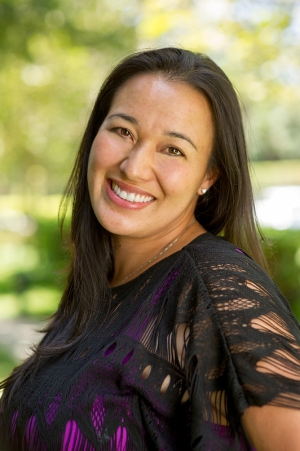Alumna's Big Break: Helping Hollywood's Retired Toward the End of Life
December 22, 2015- Alumni
This post originally appeared on the Motion Picture & Television Fund’s website, www.mptf.com.
Openness matters.
Watching Tiffany Lawrence in action, you immediately understand how an open heart can make such a big difference. Lawrence is an Motion Picture & Television Fund (MPTF) social worker who now serves as its long-term care/Harry's Haven admissions coordinator. She sees her role as “providing quality of life toward the end of life” for the 40 residents currently on her caseload and for the hundreds who have crossed her path since she joined MPTF.
But “quality” can mean many things to many people; to Lawrence, it means one. “Being myself,” she says. “How am I going to provide care for someone when they’re completely raw and vulnerable? I need to be at that level.”
As Lawrence notes, “a lot of them ask about my children every single time I see them.” And her willingness to share stories about her children matters to the older residents in several ways. It makes them feel normal. It speaks to their desire to know about the outside world. And it makes them think about their children, prompting them to share their own stories. “They learn from me and I learn from them,” Lawrence adds.
For the USC-trained social worker, her work is all about relationships—the ones she has with residents, and the ones she facilitates between residents and their families. “I’ll tell a family member when they’re going to admit someone, 'Now you can be the wife again. Or the husband again. Or the daughter again. Because you no longer have to be the caretaker.'”
At MPTF, Lawrence has seen that there are some things that matter to almost all of the residents she works with. One is family. Another is control—from who has access to their possessions to where a call button is placed. And yet another is purpose. “I have one resident who wants to work. So he’s a safety officer. He and I go around campus making sure the gates aren’t loose, seeing if a light is out…We went on a walk and he said, ‘I feel like a teenager again.’”
Lawrence has also seen what matters to various residents as individuals: “Going to the movie every Thursday and Sunday night. Being able to go to the pharmacy and buy candy. That their newspaper is there. Some have to have chocolate and iced tea every day. And some have to have wine and hard liquor! And some have had to have pecan praline ice cream.”
What matters most to Lawrence is that the residents flourish—which is what Lawrence sees when she is able to help them find and use their voices. But she isn’t always prepared for what she’ll hear. “Some talk about sex, getting into full, full detail. It’s mostly the women, telling me about their relationships. I’ll let them say whatever they want to,” says Lawrence. “Then I’ll pick my mouth up off the ground when I leave!”
To reference the work of our faculty online, we ask that you directly quote their work where possible and attribute it to "FACULTY NAME, a professor in the USC Suzanne Dworak-Peck School of Social Work” (LINK: https://dworakpeck.usc.edu)
